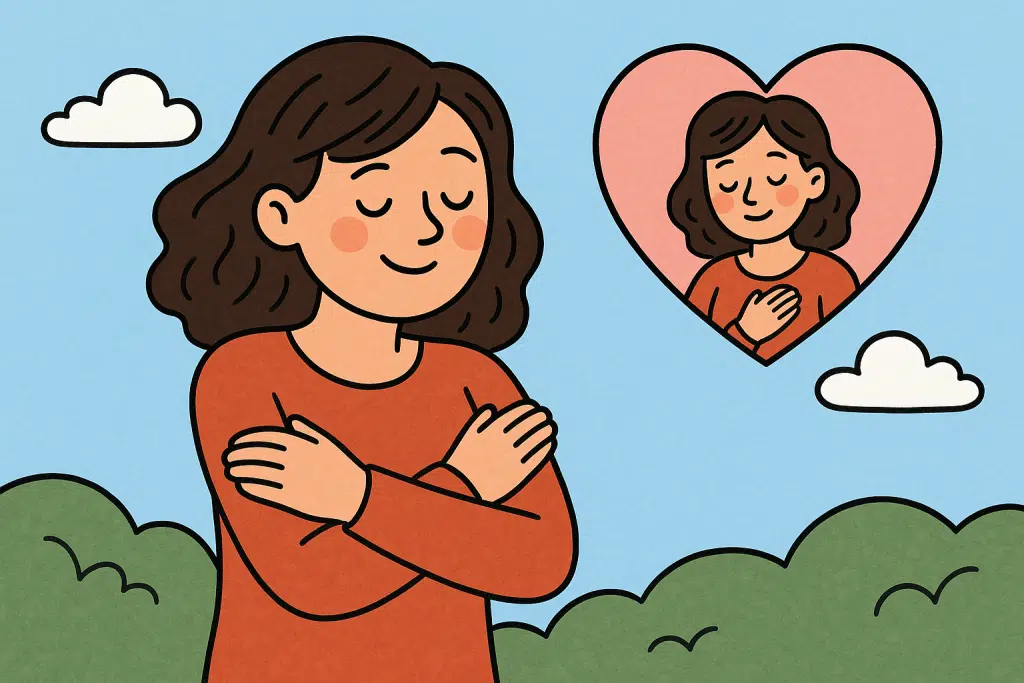Practicing Self-Compassion for Greater Mental Health
Charlotte Stone August 8, 2025
Let’s get real: you’re juggling deadlines, Slack pings, maybe a side‑hustle and your overactive perfectionist brain, right? Somewhere in that chaos, practicing self‑compassion sounds like, I don’t know, a spa weekend. But stick with me—because this isn’t about candles and bath salts (unless that’s your vibe). It’s about sneaky, everyday micro‑habits that are low‑effort but high‑impact—think one‑minute rituals that feel like a hug for your brain. Welcome to the self‑compassion economy of 2025. You’re going to thank yourself later.

Why It’s Popping Off Now
Here’s the scene: mental health concerns are skyrocketing, especially with remote work burnout, economic uncertainty, and a general sense of #adulting fatigue. Fortunately, researchers aren’t just talking FAQs—they’re studying how self‑compassion can be your brain’s bouncer against stress. Meta‑analyses show self‑compassion outperforms self‑esteem as a stress buffer, helping with resilience, emotional regulation, and honestly, not losing your mind when your inbox is on fire. And a fresh 2025 study found that self‑compassion even fuels self‑care, breaking burnout loops and boosting well‑being. It’s like spiritual multivitamin but with receipts.
Trend Spotlight: “Coffee with My Younger Self”
Okay, if you scroll through TikTok or your Instagram Reels feed lately, you’ve probably seen some version of the “Coffee with My Younger Self” trend. It’s basically people imagining themselves having a heart‑to‑heart with their teen or child self—like, “Hey, you’re doing better than you think.” It’s a modern, public twist on a therapeutic “empty chair” way to practice self‑compassion, and it’s surprisingly powerful—helping people recognize growth, resilience, and the path they’ve walked. Funny how a fictional coffee date can make you feel deeply seen, huh?
The Science: What Self-Compassion Does (for Real, No Hype)
Let’s break down the receipts.
- Longevity & Stability
A solid 2025 longitudinal study found that practicing self‑compassion, along with psychological flexibility (hello ACT), consistently reduces self‑criticism, which in turn improves mental health over time. Bottom line: being kinder to yourself isn’t short‑lived—it builds steady armor. - Career & Performance Gains
One study of ICU nurses found that self‑compassion, via better mental health and engagement, positively affected job performance—like a behind‑the‑scenes MVP working for your productivity. Real talk: when your brain is less self‑shaming, you can actually see straight and get stuff done. - Micro‑Practice Effectiveness
Tiny, consistent practices work. A 2025 writing intervention study showed that simple self‑compassion journaling lowers anxiety and stress. And a UC‑Berkeley experiment had students do a 20‑second daily affirmation (hands on heart, “I’m enough”)—stress down, emotional well‑being up. That’s proof that brief rituals can move mountains—or at least your mood.
How to Actually Do It: Your Micro-Practice Toolkit
Here’s your cheat sheet for practicing self‑compassion—no therapist needed, just a few minutes and some self‑permission.
- Coffee With You (Your Younger Self)
- Pick a photo—or just daydream—and imagine sitting across from your younger self. What would you say?
- Journal it or record it (audio, video, voice memo). Let the wisdom flow.
- The 20‑Second Heart Affirmation
- Place hands over chest and belly. Look yourself in the mirror, or close eyes.
- Say: “I am enough” or “I am worthy of rest,” for 20 seconds.
- Bonus: Do this before email marathons or stressful calls.
- Compassionate Writing Break
- Prompt: “Right now I feel… and what I need most is… because…”
- Do it for 3–5 minutes. No fluff. Just feeling then words. Proven to reduce stress.
- Mindfulness + Kindness Loop
- Pause, name what you’re feeling (“frustrated,” “tired”), then gently say to yourself, “I’m having a tough moment—and I’m doing my best.”
- This activates both mindfulness and self‑compassion, helping to stop over‑reactions.
Easy to do on your lunch break, in line for groceries, or anywhere you need to catch your breath.
Why These Tiny Habits Actually Work
Low friction — No scheduling, no apps, just you and your brain. These slip seamlessly into your existing day without demanding a lifestyle overhaul. When something takes under two minutes with zero prep, your brain stops treating it as a chore. There’s no barrier between intention and action.
Shareable — The trendiest new “self-care” you can post without sounding basic. These aren’t expensive wellness products or time-intensive rituals that scream privilege. They’re universally accessible moments that actually resonate with real life, offering genuine value instead of humble-bragging about your morning routine.
Science-rooted — They’re not just cute; each taps into mechanisms proven to reduce stress, sustain motivation, and boost mental clarity. Micro-meditations activate your parasympathetic nervous system, gratitude practices rewire neural pathways, and the “two-minute rule” leverages reward pathways. And yes, when you’re less stressed and sharper, career mojo follows.
Scalable — One moment repeated daily creates neural pathways. Those pathways become automatic responses. Those responses shape your default mindset. What starts as a tiny conscious choice evolves into your natural way of moving through the world—one moment at a time turns into a mindset.
A Realistic Example (Because Anecdotes Stick)
Picture this: It’s Wednesday, 4 pm. You’ve had three Zooms, three coffees, two “please‑just‑respond” pings, and zero lunch. You’re one typo away from a meltdown. So you take out your phone, place your hand on your heart, close your eyes, and whisper: “Hey, you’re doing your best.” Twenty seconds. Boom—suddenly your chest doesn’t feel like gravel, your brain unclenches, and you remember: you’re allowed to be human. That’s micro‑self‑compassion in action. You might even get back to that project with a fresh angle—or at least not cry into your keyboard.
When It’s Time to Go Deeper
Look, micro‑practices are great, but they aren’t the full toolkit—especially if you’re carrying heavy stuff. That’s when deeper support helps:
- Programs like Compassion‑Focused Therapy (CFT) or Acceptance & Commitment Therapy (ACT) build on self‑compassion at clinical depth (and they rock).
- If you’re leading a team, self‑compassion isn’t selfish—it’s strategic. Leaders who model authenticity and self‑kindness spark team resilience, growth mindsets, and trust culture.
Wrap-Up: Keepin’ It Real
Let me cut through the noise: self-compassion isn’t fluff. It’s practice-ground resilience. It’s the mental version of immunization—tiny exposures that make you stronger. And in 2025, when our attention spans are tiny and our stress is high, quick rituals like these are the unsung heroes. So pick one, do it today—because you literally can’t carry everything if you don’t carry yourself first.
You’re not behind. You’re human. And that’s your power.
References
- Neff, K. D. (2021). The Benefits of Self-Compassion. Greater Good Science Center. Retrieved from https://greatergood.berkeley.edu
- American Psychological Association. (2020). Self-compassion: What it is and why it matters. Retrieved from https://www.apa.org/
- Germer, C. K., & Neff, K. D. (2019). Mindful Self-Compassion: How It Can Help. Center for Mindful Self-Compassion. Retrieved from https://centerformsc.org/







